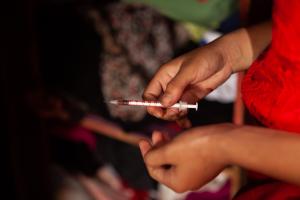

Work in 10 countries will integrate hepatitis C services into harm reduction programs and pilot underused products to reduce health risks of injection drug use Hepatitis C is becoming increasingly relegated to neglected populations that are too often overlooked by global health responses.” — Karin Timmermans, Unitaid MELBOURNE, AUSTRALIA, April 18, 2023/EINPresswire.com/ — In a […]
The post Unitaid makes US$31 million investment in harm reduction efforts to prevent hepatitis C among people who inject drugs first appeared on Social Gov.

Work in 10 countries will integrate hepatitis C services into harm reduction programs and pilot underused products to reduce health risks of injection drug use
— Karin Timmermans, Unitaid
MELBOURNE, AUSTRALIA, April 18, 2023/EINPresswire.com/ — In a major boost to harm reduction efforts, global health agency Unitaid today announced a US$31 million commitment to preventing hepatitis C among people who inject drugs and other at-risk populations such as people in prisons. The prevention tools and approaches will also help prevent transmission of other blood-borne diseases including HIV.
Breakthrough advances in recent years have made hepatitis C treatment highly effective and affordable in most low- and middle-income countries. However, limited awareness and insufficient access to care severely hinder efforts to eliminate the disease, particularly amongst communities where rates of transmission are the highest.
Though people who inject drugs represent just 10% of the 58 million people infected with hepatitis C worldwide, injection drug use contributes to 43% of all new infections.
Unitaid’s funding will support the integration of hepatitis C testing and treatment within harm reduction programs and trial the use of two products to prevent infection: low dead space syringes and new, long-acting formulations of buprenorphine, a medicine used in opioid agonist therapy.
Low dead space syringes have a smaller reservoir where blood can remain after use, which limits the risk of transmitting blood-borne infections when needles are shared. Slow-release formulations of buprenorphine, a medicine that reduces opioid cravings and withdrawal, could provide a valuable option for clients who face challenges with daily doses of the oral formulation, such as high out-of-pocket expenses, police harassment, or discrimination.
Apart from some limited use in Ukraine, long-acting buprenorphine is not available in any low- or middle-income country. And, though many countries have low dead space syringes, critical gaps in understanding and user preferences have severely hindered their uptake.
“Hepatitis C is becoming increasingly relegated to neglected populations that are too often overlooked by global health responses,” said Karin Timmermans, Senior Technical Manager at Unitaid, speaking at the 27th Harm Reduction International Conference in Melbourne. “Unitaid is proud to step up in support of harm reduction approaches to treat and prevent hepatitis C among people who face the greatest barriers to care.”
“We welcome Unitaid’s commitment to prevent hepatitis C through harm reduction approaches and, importantly, for centering meaningful community involvement from its inception,” said Judy Chang, Executive Director of the International Network of People who Use Drugs (INPUD). “Funding community-led research and advocacy on the best approaches to prevent and treat hepatitis C is an important step towards promoting a more equitable health landscape. We look forward to working with Unitaid and partners to ensure our voices and perspectives are heard and represented.”
80% of all those affected by hepatitis C live in low- and middle-income countries. People who face the greatest barriers to accessing healthcare are disproportionately impacted.
Both hepatitis C and harm reduction have been critically underfunded, further marginalizing already vulnerable populations. Unitaid’s investment represents a 20% increase in funding in support of harm reduction in low- and middle-income countries.
“By prioritizing harm reduction, we can ensure that people at greatest risk have access to the tools they need to protect themselves from hepatitis C and other blood-borne infections,” said Dr Meg Doherty, Director of Global HIV, Hepatitis, and Sexually Transmitted Infection Programs, World Health Organization. “This investment will not only benefit the communities of people who inject drugs directly targeted by the projects, but it will also contribute to broader public health. We commend Unitaid for its leadership and commitment to promoting health equity.”
Implemented through three complementary projects in a total of ten countries, Frontline AIDS, Médecins du Monde and PATH will work to ensure people at greatest risk are aware of the need for hepatitis C testing and have quick and easy access to treatment.
The projects will also generate evidence critical to enabling the broader use of low dead space syringes and long-acting buprenorphine, including understanding user preferences, addressing high costs, increasing demand, and demonstrating effective delivery.
Both products will be piloted at sites in Egypt, India, Kyrgyzstan, Nigeria, South Africa, Tanzania, Ukraine, and Vietnam. Sites in two additional countries – Armenia and Georgia – will trial low dead space syringes. All ten countries will integrate service delivery within harm reduction programs.
This latest initiative builds on a longstanding commitment from Unitaid to address hepatitis C. Previous support has helped drive down the cost of services, simplify screening and diagnosis, demonstrate effective delivery strategies to reach at-risk populations, and increase awareness.
Maggie Zander
Unitaid
[email protected]
Visit us on social media:
Facebook
Twitter
LinkedIn
Instagram
![]()
Article originally published on www.einpresswire.com as Unitaid makes US$31 million investment in harm reduction efforts to prevent hepatitis C among people who inject drugs
The post Unitaid makes US$31 million investment in harm reduction efforts to prevent hepatitis C among people who inject drugs first appeared on Social Gov.
originally published at Global News - Social Gov

 ,
,
